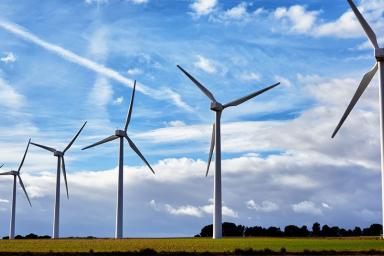What is net zero? An introduction for small businesses
Learn more about what net zero is, why it's important and what it means for the UK's small businesses.
In June 2019, the UK Government committed to reducing the UK's net greenhouse gas emissions by at least 100% by 2050, compared to 1990 levels.
This target is known as net zero, and milestones towards moving to a net zero emissions economy are now set down in UK law.
By encouraging sectors, industries, organisations and individuals to work together in cutting carbon emissions, the hope is that, over the coming decades, the UK can achieve its net zero ambitions and, as a consequence, help reduce global warming and the effects of climate change.
Read on to learn more about net zero - what it is, why it's important and what it means for businesses and business owners across the UK.
What is net zero?
In simple terms, being net zero means adding no more greenhouse gases to the Earth's atmosphere than the amount you're taking out.
Greenhouse gases - carbon dioxide is the main one, hence the term 'carbon emissions' - are harmful in that they let sunlight pass through the atmosphere but stop the heat from the sunlight going back out into space. Over time, this trapped heat has contributed to global warming and climate change.
The carbon emissions produced through industry, transport and agriculture are making this worse. Net zero is intended to help lessen these climate-changing effects and limit global warming to levels that are safer for the world's population.
Carbon neutral vs net zero: what's the difference?
People often use the terms 'carbon neutral' and 'net zero' as though they're the same thing, but there is a slight difference.
If you're a carbon neutral business, for example, you're offsetting the carbon emissions you produce, perhaps by planting trees or supporting renewable energy programmes.
This doesn't necessarily mean, however, that you're net zero, as you might be not be reducing carbon emissions, only offsetting them. As explained above, net zero is all about helping to reduce to zero (compared to 1990 levels) the greenhouse gases already in the Earth's atmosphere.
What does net zero mean for my business?
The Government's stance is that taking action on climate change will help businesses grow, seize new opportunities, create new jobs, encourage investment and adapt against the challenges of a changing planet.
It also believes that by reducing emissions, businesses across the UK will be able to:
- lower their running costs - and save money as a result
- attract new customers and investors
- maintain a competitive advantage, both locally and globally
- qualify for tax benefits
- build a better, more sustainable supply chain
Even the smallest businesses produce carbon emissions, whether it's through their premises, the vehicles they use, or their supply chain, for example.
But reaching net zero is about more than just balancing carbon emissions. What's really involved here is bringing about a transformation in the way businesses of all sizes operate.
The Government won't be able to achieve its ambitions for net zero without the support of the UK's businesses. Given that small and medium-sized enterprises account for 99.9% of the business population in the UK (as of 2020), they will have an extremely vital role to play.
How can my small business move to net zero?
If you run a small business, the Zero Carbon Business website lays out a number of measures you can put in place to begin cutting your carbon emissions. Some are quick and easy, some require a bit more planning and expense.
Basic steps
- Recycle more - by recycling your paper, plastic and other materials, you're helping to reduce waste and lessen the impact on the environment.
- Reduce waste - by making less waste, or managing it more efficiently, there's less of it going to landfill, which ultimately benefits the environment.
- Make it company policy - put a net zero plan in place, consult and train your staff, and promote your green achievements to customers and suppliers.
Further steps
- Use electricity from renewable sources - not only does this lower your carbon emissions, but it can help you prepare for environmental laws and regulations that may come into force in the future.
- Drive less, or switch to electric vehicles - given that over a quarter of the UK's total carbon emissions are due to petrol- and diesel-powered transport, encouraging staff to walk, cycle or use public transport, and making the move to low-emissions company cars, can reduce your impact on the environment and save you money.
- Cut down on packaging - if you can avoid it altogether, great! If not, try to use natural, recyclable and recycled materials.
- Make your supply chain greener - by using suppliers that are lowering their own carbon emissions, and by buying products that take less energy to make, transport and use, you can reduce your business's supply chain emissions.
How did this net zero target come about?
The Government's target of net zero by 2050 follows years of worldwide activity to tackle climate change.
November 2008
The UK Government passes the Climate Change Act, a law that commits it to reducing the UK's greenhouse gas emissions by 80% by 2050, compared to 1990 levels.
December 2015
At the 21st UN Climate Change Conference of the Parties (COP21), 196 countries adopt the Paris Agreement. This international treaty aims to limit global warming to (ideally) 1.5ºC, compared to pre-industrial levels.
To achieve this goal, the nations involved will work together to stabilise global greenhouse gas emissions, then reduce them.
October 2018
The Intergovernmental Panel on Climate Change (IPCC) publishes a report that says global emissions need to reach net zero by around 2050 for the Paris Agreement's 1.5ºC global warming target to be achievable.
May 2019
Asked to advise on the UK Government's and devolved nations' long-term targets for greenhouse gas emissions, the Climate Change Committee (CCC) recommends that:
- the UK should aim for net zero emissions by 2050 (rather than just the 80% reduction it committed to in the 2008 Climate Change Act)
- Scotland should implement a net zero date of 2045, as a reflection of its "greater relative capacity to remove emissions than the UK as a whole"
- Wales should aim to reduce greenhouse gas emissions by 95% by 2050, due to it having "less opportunity for CO2 storage and relatively high agricultural emissions that are hard to reduce"
June 2019
The UK Government signs into law its new net zero target - reducing emissions by 100% from 1990 levels by 2050 - replacing the 80% target set out in the 2008 Climate Change Act.
April 2021
In its Sixth Carbon Budget, the UK Government commits to setting down in law a new target to reduce emissions by 78% by 2035, compared to 1990 levels.
The Together for our Planet campaign
In preparation for the 26th UN Climate Change Conference of the Parties (COP26) in Glasgow in November 2021, the Government has launched the Together for our Planet campaign, calling on every small business in the UK to take small, practical steps to commit to cutting their greenhouse gas emissions.
The Together for our Planet campaign encourages small businesses of up to 250 employees to visit the UK Business Climate Hub and begin their journey to net zero by making the SME Climate Commitment. This pledge is to halve greenhouse gas emissions before 2030, achieve net zero emissions before 2050, and share information on their progress each year.
Disclaimer: We make reasonable efforts to keep the content of this article up to date, but we do not guarantee or warrant (implied or otherwise) that it is current, accurate or complete. This article is intended for general information purposes only and does not constitute advice of any kind, including legal, financial, tax, or other professional advice. You should always seek professional or specialist advice or support before doing anything on the basis of the content of this article.
Neither British Business Bank plc nor any of its subsidiaries are liable for any loss or damage (foreseeable or not) that may come from relying on this article, whether as result of our negligence, breach of contract or otherwise. “Loss” includes (but is not limited to) any direct, indirect, or consequential loss, loss of income, revenue, benefits, profits, opportunity, anticipated savings, or data. We do not exclude liability for any liability which cannot be excluded or limited under English law.
Tags related to this content:
Green Decoder
Featuring a glossary of sustainable terms curated in partnership with the Nottingham Business School, Nottingham Trent University, our green decoder is helping smaller businesses decipher the terminology surrounding decarbonisation.
Your previously read articles
Additional support
UK Business Climate Hub
Businesses of all sizes around the UK are committing to do their bit to cut carbon emissions and protect the planet. The UK Government has partnered with business owners and respected climate groups to help you join them today.
Visit website Business Climate HubZero Carbon Business
A partnership between business organisations, energy networks and professional bodies to give small businesses the advice they need to reduce their carbon emissions. Visit the website for free and impartial information.
Visit website Zero carbon businessClimate Change Committee (CCC) – Net zero infographic
A visual depiction of what net zero is, why it’s so important and its intended effects in tackling climate change and global warming.
View infographic (.PDF, 776 KB) showing route to net zero (Opens in new window)Federation of Small Businesses (FSB) – 11 key climate change terms your business needs to know
Confused by carbon jargon? From carbon neutrality to net zero, learn what the sustainability buzzwords mean for your small business.
Learn more about Carbon JargonClimate Change Committee (CCC) – What is climate change?
Learn more about the causes behind global climate change and the scientific findings that have led to the transition to net zero.
Learn more about what is climate change


